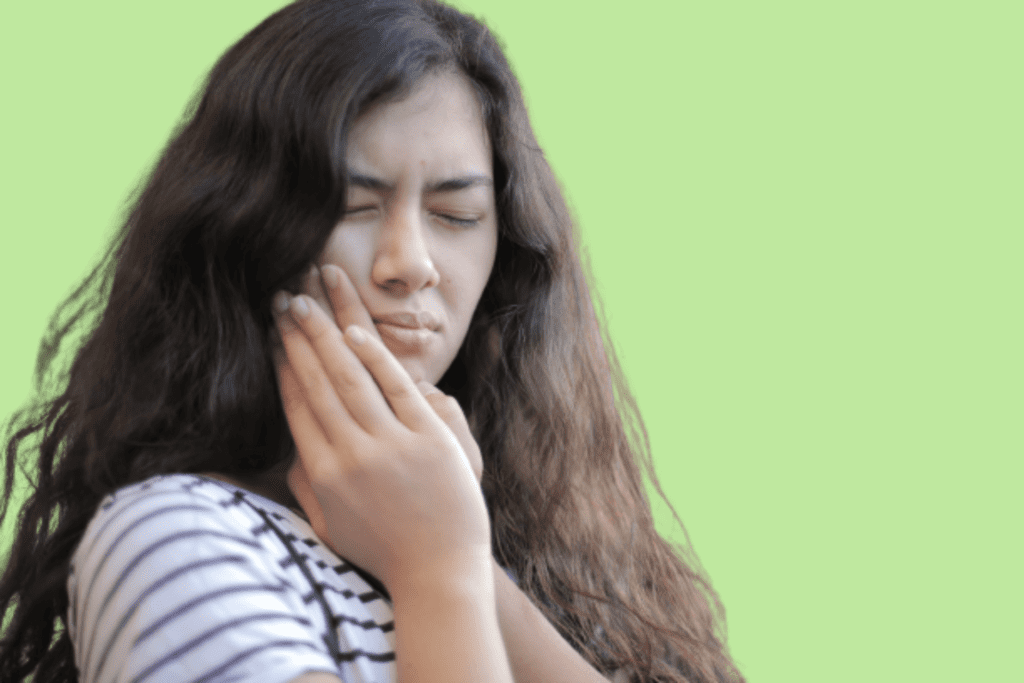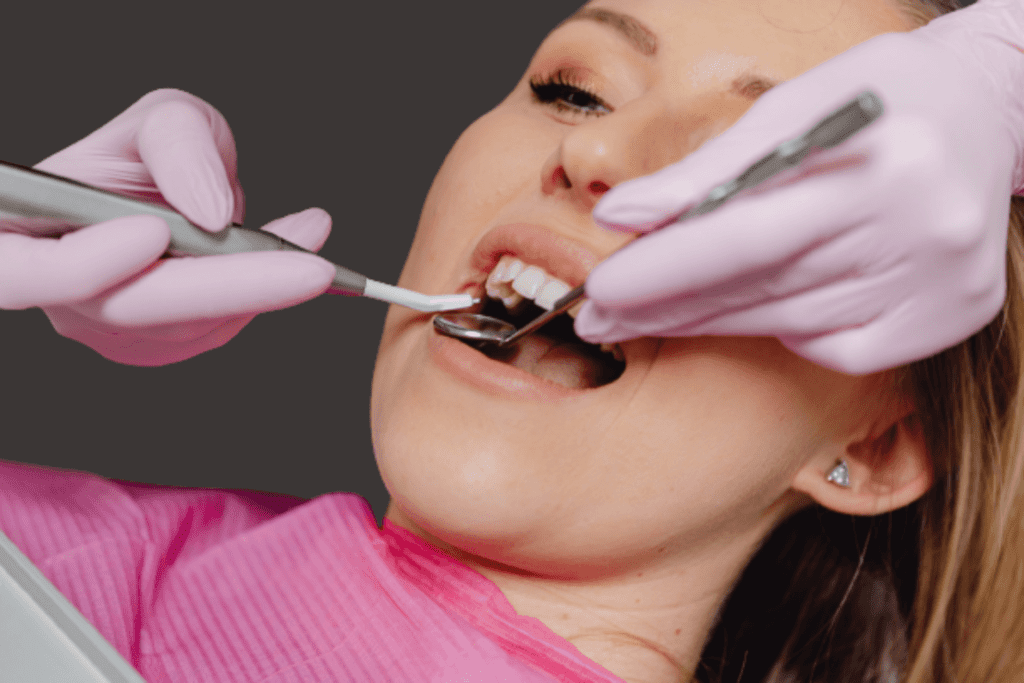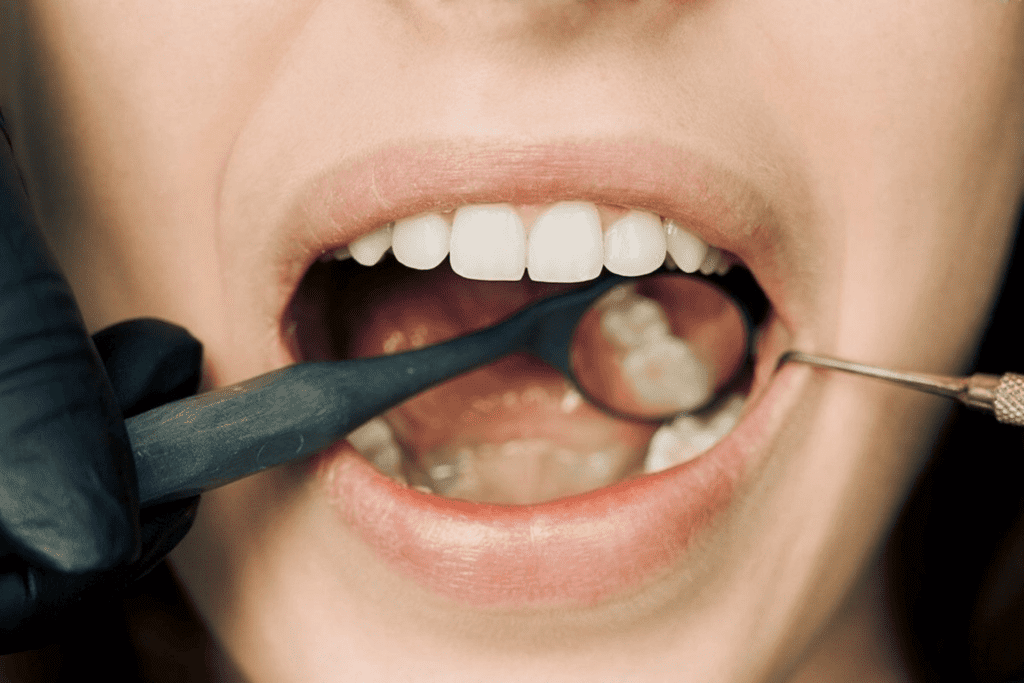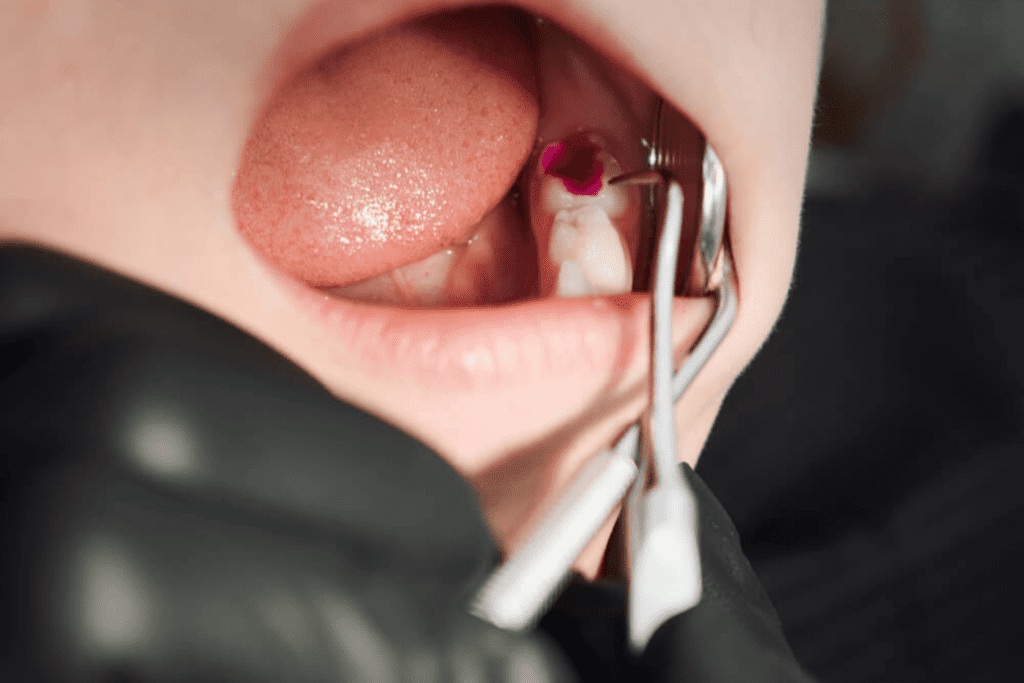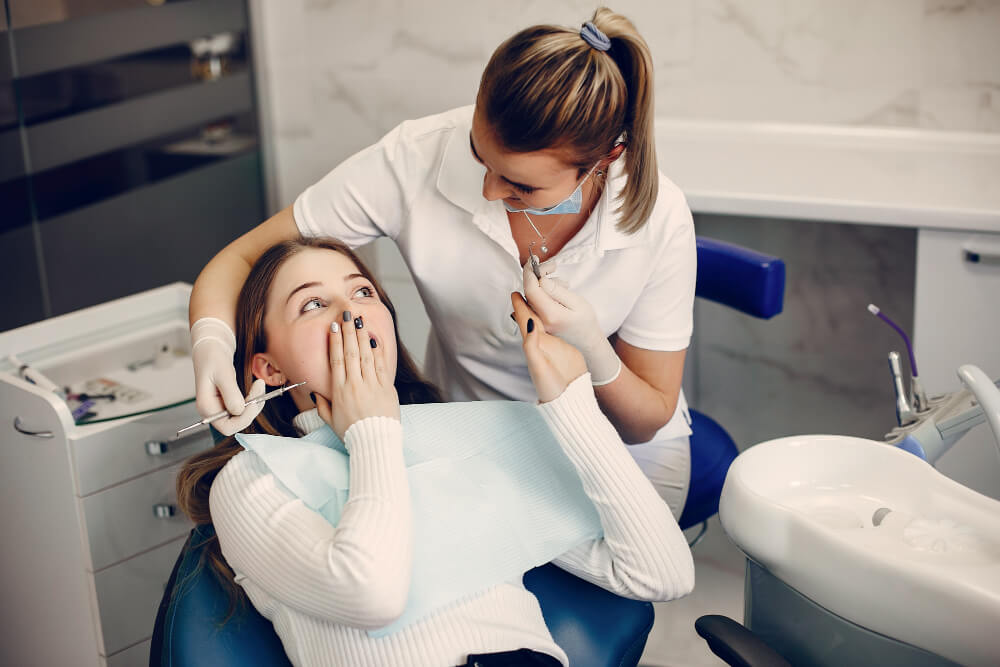
What is Dental Anxiety or Fear of Dentist?
Dental anxiety, also known as a fear of the dentist, is a psychological condition characterized by an overwhelming sense of fear, apprehension, or unease when it comes to dental procedures. Individuals with dental phobia often experience heightened stress levels, increased heart rate, and even panic attacks when faced with the idea of visiting a dentist or undergoing dental treatments. This fear may stem from various factors, such as past traumatic experiences, fear of pain, or a general fear of needles and instruments. Dental anxiety can have a significant impact on oral health, as individuals may avoid necessary dental care, leading to more severe dental problems in the long run.
Table of Contents
ToggleHow Common is Dental Anxiety?
Dental anxiety is a common condition that affects a significant number of people worldwide. Studies have reported that approximately 9% to 20% of the global population experiences dental anxiety to some degree. The prevalence of dental phobia can vary among individuals and populations, with some people experiencing mild anxiety while others may have severe phobias that can interfere with their oral health care. Factors such as previous traumatic dental experiences, fear of pain, embarrassment, or a general anxiety disorder can contribute to the development of dental anxiety. It is important to note that dental phobia can be managed and treated effectively with the help of understanding dental professionals and techniques designed to alleviate anxiety and improve the dental experience.
Symptoms of Scared of Dentist
The symptoms of being scared of the dentist, or dental anxiety, can vary from person to person. Here are some common symptoms that individuals with dental phobia may experience:
Intense Fear or Unease
People with dental phobia often experience a strong and overwhelming fear or unease specifically related to dental visits. This fear can be triggered by various factors, such as the dental environment, the sound of dental tools, or the anticipation of potential pain or discomfort.
Increased Heart Rate and Breathing
When experiencing dental phobia, individuals may notice physical symptoms such as an increased heart rate (palpitations) and rapid breathing (hyperventilation). These physiological responses are common during periods of heightened stress or anxiety.
Difficulty Sleeping or Restlessness
Dental phobia can cause sleep disturbances or restlessness, especially in the days leading up to a dental appointment. Thoughts and worries about the upcoming visit can interfere with normal sleep patterns.
Avoidance Behavior
People with dental anxiety often exhibit avoidance behavior, which means they actively try to avoid dental visits or delay appointments. This avoidance can be due to the fear of the dentist, dental procedures, or even the associated sounds and smells of the dental clinic.
Panic Attacks
In severe cases, the fear of the dentist can trigger panic attacks. Panic attacks are intense episodes of fear or terror accompanied by physical symptoms such as shortness of breath, chest pain, dizziness, sweating, and a sense of impending doom.
Nervousness or Irritability
Fear of the dentist can lead to feelings of nervousness and irritability. The anticipation of a dental visit or even thinking about dental procedures can create a constant state of unease, making individuals feel on edge or easily agitated.
Physical Discomfort or Tension
Dental phobia can manifest as physical symptoms, including muscle tension, headaches, stomachaches, or gastrointestinal discomfort. These symptoms can be a result of the body’s stress response to the anxiety experienced during dental visits.
Types of Dental Phobia
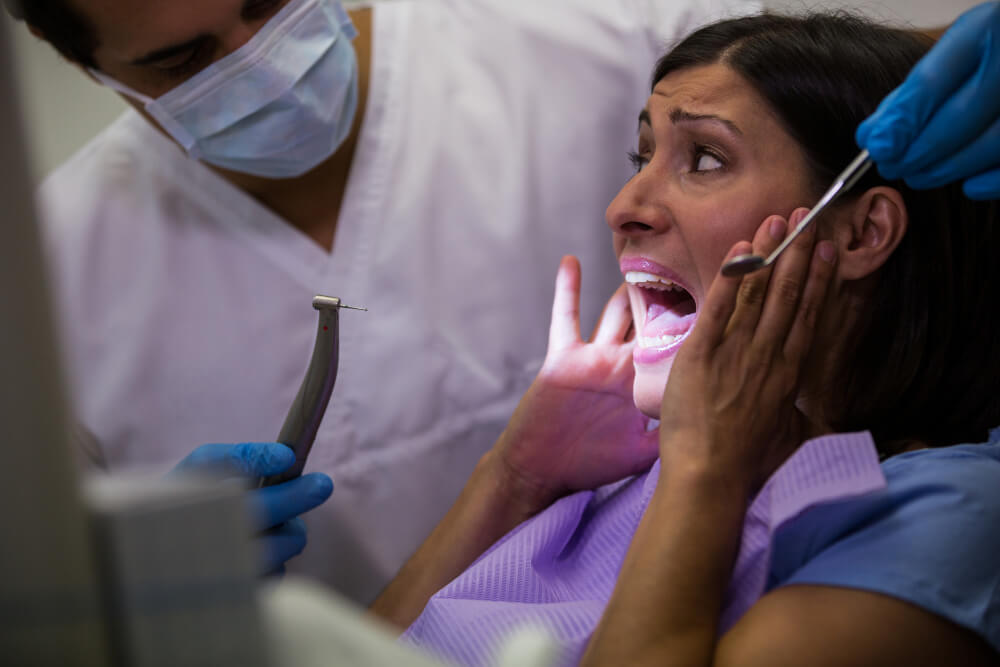
Dental phobia refers to an extreme and irrational fear of the dentist or dental procedures. There are different types or categories of dental phobias that individuals may experience. Some common types of dental phobia include
1. Needle Phobia
Also known as trypanophobia, this type of phobia is specifically related to the fear of needles or injections. Individuals with needle phobia may experience extreme anxiety or panic solely due to the anticipation or sight of needles used in dental procedures like local anesthesia or intravenous sedation.
2. Dental Drill Phobia
This type of phobia revolves around the fear of dental drills or the sound and vibration they produce. The high-pitched noise and physical sensation of the dental drill can trigger intense anxiety and discomfort.
3. Dental Instrument Phobia
Some individuals may have a specific fear of the various dental instruments used during procedures, such as scalpels, forceps, or retractors. The sight or even the thought of these instruments can evoke strong fear responses.
4. Claustrophobia
People with claustrophobia may experience fear and anxiety when confined in small or enclosed spaces, such as dental chairs or dental imaging machines like X-ray devices or CT scanners. The sense of being trapped or confined can intensify their anxiety.
5. Gag Reflex Phobia
Gag reflex phobia, also known as gagging phobia or dental phobia related to the fear of choking or gagging, is characterized by a heightened sensitivity to having objects placed in the mouth. The fear of gagging can make dental procedures, especially those involving impressions or X-rays, extremely challenging for individuals with this phobia.
Causes of Dental Anxiety

Dental anxiety can arise due to various causes, and it often results from a combination of factors. There are several factors commonly associated with the development of dental phobia, including:
Previous Traumatic Dental Experiences
Negative experiences, such as a painful or distressing dental procedure, can create a lasting impression and contribute to dental phobia. These experiences may involve significant pain, complications, or perceived mistreatment by dental professionals. The memory of such experiences can make individuals apprehensive and fearful about future dental visits.
Fear of Pain
The fear of experiencing pain or discomfort during dental procedures is a common cause of dental anxiety. It may stem from past experiences, stories heard from others, or a general fear of dental procedures. The anticipation of pain can trigger anxiety and make individuals avoid or delay necessary dental treatments.
Loss of Control
Dental procedures often require individuals to sit still and allow dental professionals to work inside their mouths. This loss of control can be unsettling for some people and contribute to dental anxiety. The feeling of helplessness or vulnerability during dental treatments can intensify anxiety.
Dental Phobias or Specific Fears
Specific phobias related to dental procedures or equipment can contribute to dental anxiety. For example, needle phobia (trypanophobia) can cause extreme fear or panic at the sight or thought of injections. Drill phobia may stem from the fear of the sound, vibration, or use of dental drills. Gag reflex phobia can make individuals extremely sensitive to having objects placed in their mouths.
Embarrassment or Self-Consciousness
Many individuals feel self-conscious about their teeth, oral health, or the appearance of their mouths. This self-consciousness can be a source of embarrassment during dental visits, especially if they believe their oral health is poor or they have dental imperfections. The fear of being judged or criticized by the dentist can contribute to dental anxiety.
Fear of Dental Equipment and Sounds
The sight, sound, and smell of dental instruments and equipment can be anxiety-inducing for some individuals. The unfamiliarity and perceived discomfort associated with these tools can trigger anxiety. The sound of dental drills or suction devices, for example, can be particularly distressing for those with dental anxiety.
Generalized Anxiety or Phobias
People who experience generalized anxiety or have other phobias unrelated to dentistry may be more prone to dental anxiety. Underlying anxiety disorders or a history of phobias can influence the development of a dental phobia. The fear and anxiety experienced in other areas of life can extend to dental situations as well.
Personal or Cultural Beliefs
Personal beliefs and cultural influences can contribute to dental anxiety. Negative cultural stereotypes or misinformation about dental care may shape an individual’s perception and fear of dental visits. For example, cultural beliefs associating dental care with pain or negative outcomes can contribute to anxiety.
How to Treat or Calm Dental Anxiety?
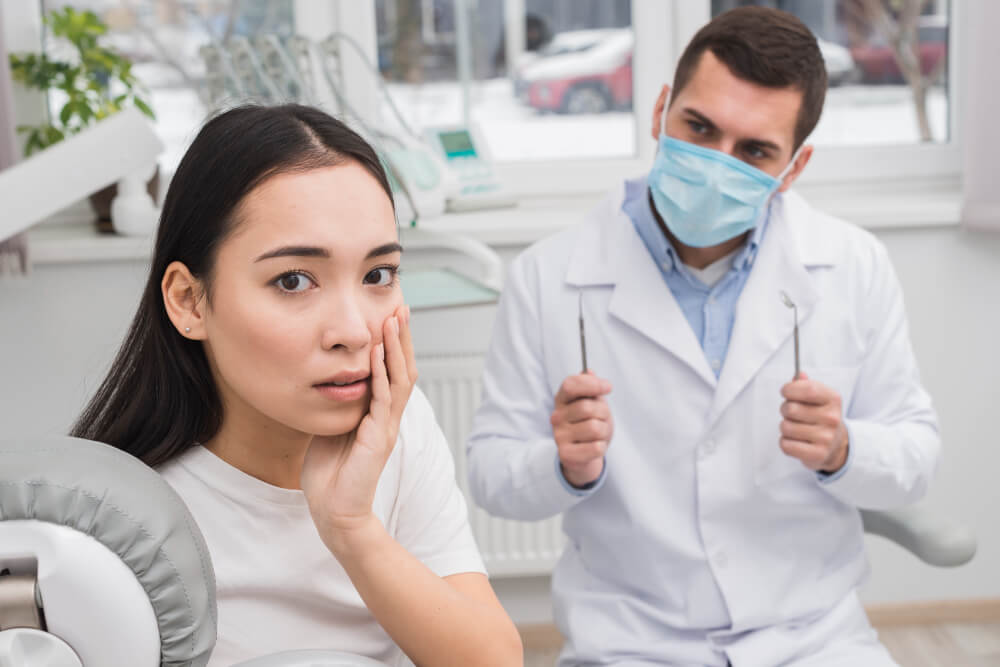
Treating dental anxiety involves a combination of strategies to help manage and alleviate fear and discomfort during dental visits. Here are some common approaches:
Open Communication
When you communicate your dental anxiety to your dentist, it allows them to understand your specific fears and concerns. They can take the time to explain procedures, answer your questions, and address any anxieties you may have. This open dialogue helps build trust and creates a supportive environment for your dental care.
Establish Trust
Finding a dentist who specializes in treating anxious patients or has experience in handling dental anxiety can help build trust. Knowing that your dentist is familiar with and sensitive to your fears can significantly alleviate anxiety. Building a trusting relationship with your dentist will help you feel more comfortable and confident during dental visits.
Gradual Exposure
For individuals with severe dental anxiety, a gradual exposure approach can be effective. This involves starting with less invasive procedures or simple dental visits and gradually progressing to more extensive treatments. This step-by-step approach allows you to become more accustomed to the dental environment, reducing anxiety over time.
Deep Breathing
To induce a sense of calmness and relaxation, engage in deep breathing exercises. Begin by taking slow, deep breaths in through your nose, allowing your abdomen to expand. After taking slow, deep breaths in through your nose, pause briefly, and then release your breath gradually through your mouth. By focusing on your breath, you can divert your attention away from anxious thoughts and promote a slower heart rate and a relaxed state in your body.
Progressive Muscle Relaxation
This technique involves systematically tensing and releasing different muscle groups in your body to promote relaxation. Start by tensing and then relaxing your muscles, starting from your toes and working your way up to your head. This process helps release tension and reduce overall anxiety.
Visualization
Create a calming mental image or scenario in your mind. Imagine yourself in a peaceful and serene place, such as a beach or a garden. Visualize the sounds, sights, and sensations associated with that place to create a sense of tranquility. Engaging in positive visual imagery can help distract your mind from dental anxieties.
Distractions
Engaging in distractions during dental procedures can divert your attention from anxiety-inducing stimuli. Bringing headphones and listening to your favorite music, podcasts, or audiobooks can help create a more enjoyable and less anxiety-provoking experience. Some dental offices provide TVs or virtual reality headsets to further distract and entertain patients.
Sedation Dentistry
Depending on the level of dental anxiety, your dentist may offer sedation options. Nitrous oxide, commonly known as laughing gas, can induce a state of relaxation and reduce anxiety. Oral sedatives or intravenous (IV) sedation may also be used to provide a deeper level of relaxation during dental treatments. Discuss these options with your dentist to determine what is most suitable for your level of anxiety.
Local Anesthesia
Requesting the use of local anesthesia can help numb the treatment area, reducing or eliminating any pain or discomfort during dental procedures. Knowing that you won’t feel pain can significantly alleviate fears associated with dental treatments.
Cognitive-Behavioral Therapy (CBT)
CBT techniques can be beneficial for addressing dental phobia. Working with a therapist who specializes in dental anxiety or phobia can help you identify and challenge negative thought patterns and develop coping strategies. Relaxation training, cognitive restructuring, and exposure therapy are some CBT techniques that can be used to manage dental phobia.
Pre-Visit Familiarization
Visit the dental office before your scheduled appointment to familiarize yourself with the environment. Meet the staff, explore the surroundings, and ask any questions you may have. Getting acquainted with the dental setting can help reduce the fear of the unknown and make subsequent visits less intimidating
Support Person
Bringing a trusted friend or family member to accompany you during dental visits can provide comfort and emotional support. They can help distract you from anxiety-inducing thoughts, offer reassurance, and act as an advocate on your behalf. Their presence can provide a sense of security and help ease your dental anxiety.
Remember, the treatment of dental anxiety should be personalized to your specific needs and preferences. Working together with your dentist, discussing your fears openly, and exploring different strategies can help you effectively manage and overcome dental phobia for a more comfortable dental experience.
Dental Anxiety vs. Dental Phobia
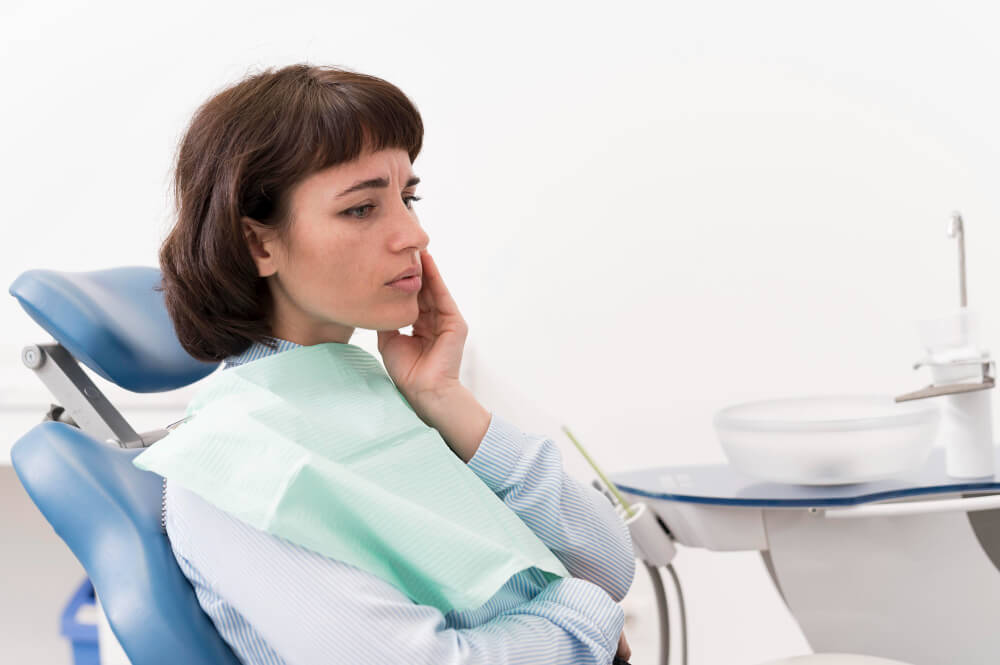
Dental anxiety and dental phobia are related but distinct terms used to describe different levels of fear and distress related to dental visits and treatments. Here’s a comparison between the two:
Dental Anxiety
- Dental anxiety refers to a general feeling of unease or nervousness associated with dental visits or procedures.
- It is a common response to dental care and affects a significant portion of the population.
- People with a fear of the dentist may experience heightened stress, restlessness, or discomfort before and during dental appointments.
- Dental phobia can range from mild to moderate and is usually manageable with supportive measures and coping strategies.
- With dental anxiety, individuals may still undergo dental treatments, although they may feel anxious and may require additional support to alleviate their fears.
Dental Phobia
- Dental phobia, on the other hand, is an intense, irrational, and overwhelming fear of dental visits or procedures.
- It is more severe and debilitating than dental anxiety, often leading to avoidance of dental care altogether.
- Individuals with dental phobia may experience extreme panic, terror, or even physical symptoms such as palpitations, sweating, or nausea when faced with the thought or actuality of a dental appointment.
- Dental phobia can significantly impact oral health as individuals may avoid necessary dental treatments, leading to further oral health issues.
- Treating dental phobia often requires specialized techniques, such as behavioral therapies or sedation dentistry, to help individuals manage and overcome their fear.
Conclusion
In conclusion, dental anxiety and dental phobia are distinct yet interconnected experiences that individuals may face when it comes to dental visits and treatments. Dental phobia is a common response characterized by unease or nervousness, while dental phobia represents an intense, irrational fear that can lead to avoidance of dental care. Both conditions can significantly impact a person’s oral health and well-being.
Understanding the causes, symptoms, and types of dental anxiety and dental phobia is essential in addressing these concerns effectively. Open communication with dentists, establishing trust, and gradual exposure to dental treatments can help manage dental phobia. Techniques such as relaxation, distraction, and sedation options can provide additional support for individuals with heightened anxiety.
For those with dental phobia, specialized interventions like cognitive-behavioral therapy, exposure therapy, and sedation dentistry may be necessary to overcome the overwhelming fear. Building a supportive and understanding dental team, along with patient education and gradual desensitization, can play a vital role in helping individuals with dental phobia regain control and receive the necessary dental care.
Overall, the goal is to provide a comfortable and positive dental experience for individuals with dental anxiety and dental phobia. By addressing fears, utilizing appropriate strategies, and fostering a collaborative approach between patients and dental professionals, it is possible to manage and overcome these anxieties, ensuring optimal oral health and overall well-being.
Read Next: 10 Things to Do Before a Dentist Appointment
Resources
Image Designed by freepik
References
https://pubmed.ncbi.nlm.nih.gov/33711405/
https://www.mdpi.com/2673-6373/2/1/10
https://www.ncbi.nlm.nih.gov/pmc/articles/PMC4790493/
https://en.wikipedia.org/wiki/Dental_fear
https://www.frontiersin.org/articles/10.3389/fpsyg.2017.01155/full
https://www.mouthhealthy.org/all-topics-a-z/anxiety/

